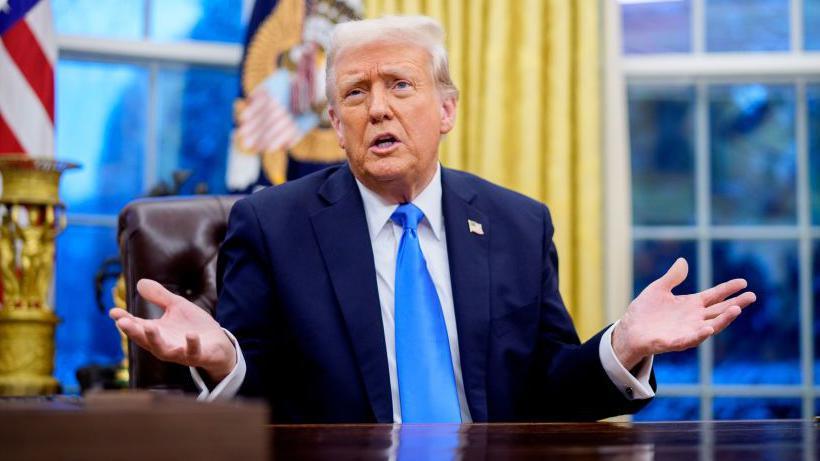Trump tariff VAT threat raises fears of hit to UK

- Published
Concerns are growing the UK could be more exposed to US trade taxes after President Donald Trump announced he would target VAT in his latest move.
Trump has instructed his staff to develop custom so-called "reciprocal tariffs" for individual countries based in part on trading agreements, including imports and exports, with the US.
The UK's trading relationship with US had suggested it would be less exposed to tariffs than others, but the surprise inclusion of VAT to calculate potential tariffs has prompted questions over the impact on British businesses.
Analysts have suggested tariffs of 20% or more could be placed on the UK as well as the European Union, but the outcome remains uncertain.
The British Chambers of Commerce (BCC) business group warned that cars, pharmaceuticals, and food and drink were specific goods which could be "significantly hit" by the measures, which were announced by the White House on Thursday.
The latest announcement by Trump administration was wide-ranging and threatened retaliation by the US for not just trade tariffs, but for other "unfair or harmful acts, policies or practices".
One of the justifications Trump has given to date for imposing tariffs on countries is whether they have a trade surplus with the US - i.e. they sell more to the US than they import from the country.
The use of tariffs is part of Trump's efforts to protect American businesses and boost manufacturing.
Trump launches plan to target countries with new tariffs
- Published14 February
UK not planning to hit back at US on steel tariffs
- Published11 February
UK signals it will seek US steel tariff exemption
- Published13 February
Both the UK and US claim to have trade surpluses with each other due to discrepancies in how the countries collect data. It remains uncertain whether Trump would exempt the UK from tariffs, but the introduction of Value Added Tax (VAT) into the equation complicates matters.
The president's latest announcement cited VAT as an "unfair, discriminatory or extraterritorial tax".
VAT tax is the tax people have to pay when people buy most goods or services, apart from food and children's clothes. The standard rate in the UK is 20% and it is levied regardless of whether a product has been imported from overseas or not.
George Saravelos, global head of FX research at Deutsche Bank, said if the US imposed taxes based on existing tariffs and VAT combined, British businesses exporting to the US could face charges of 21%.
"If reciprocal tariffs are applied on a VAT basis, European countries would be much higher on the list of impacted countries," he said.
William Bain, head of trade policy at the BCC, said the UK had a "level of insulation" due to it not exporting as many goods to the US in comparison to other countries.
But he warned Trump's proposals would "create more cost and uncertainty" and "upend established trade norms".
Fiona Conor, managing director of Trust Electric Heating, a Leeds-based radiator manufacturer which has plans to expand into the US, said if tariffs applied to her products, she would not want to pass on the costs through higher prices to customers.
But she told the BBC's World At One that she was looking at starting production in the US "because there is real, huge tax breaks for innovative companies like us to set up manufacturing in the US".
She said the government should "be strong negotiators", adding that Prime Minister Sir Keir Starmer needed to "strengthen our partnership" with the US.
Paul Ashworth, chief UK economist for Capital Economics, said that most people would regard VAT as a non-discriminatory tax as it is applied to all goods whether they were produced domestically or imported.
But he noted one of Trump's advisers had argued that given the US applied a much lower average sales tax at state level, VAT was a "form of discriminatory tariff".
Mr Ashworth said it appeared the US president now favoured tariffs to be imposed on a "country-by-country basis" as opposed to his original idea of introducing universal tax on all imports to the US.
'Difficult to predict'
A tariff is a tax on imports collected by a government and it is paid by the company importing the good. Countries typically erect tariffs in a bid to protect certain sectors from foreign competition.
But in protecting domestic businesses, prices for consumers can go up if a company importing goods from abroad passes higher costs on, rather than absorbing them or reducing imports.
Caroline Ramsay, partner and head of international trade at law firm TLT, said it was "difficult to predict" what the latest announcement would mean for the UK.
She suggested the word "reciprocal" did not mean what people might have first assumed, adding an assessment by the US would be made on what it considers to be fair.
"It does not mean that the USA is going to check what the UK tariff is on paper imports and match that tariff percentage for paper exports to the US from the UK," she added.
Mr Bain argued it was "vital" that the UK government negotiated with Trump and did not get "sucked into a trade war of tit-for-tat tariffs".
Senior UK government minister Pat McFadden said the government would wait before reacting.
"The most sensible thing to do with all of these announcements is to digest them, see if they actually come to pass, and then decide what you do."